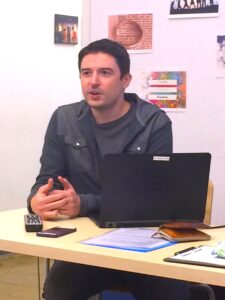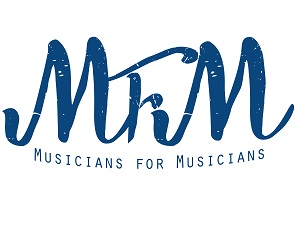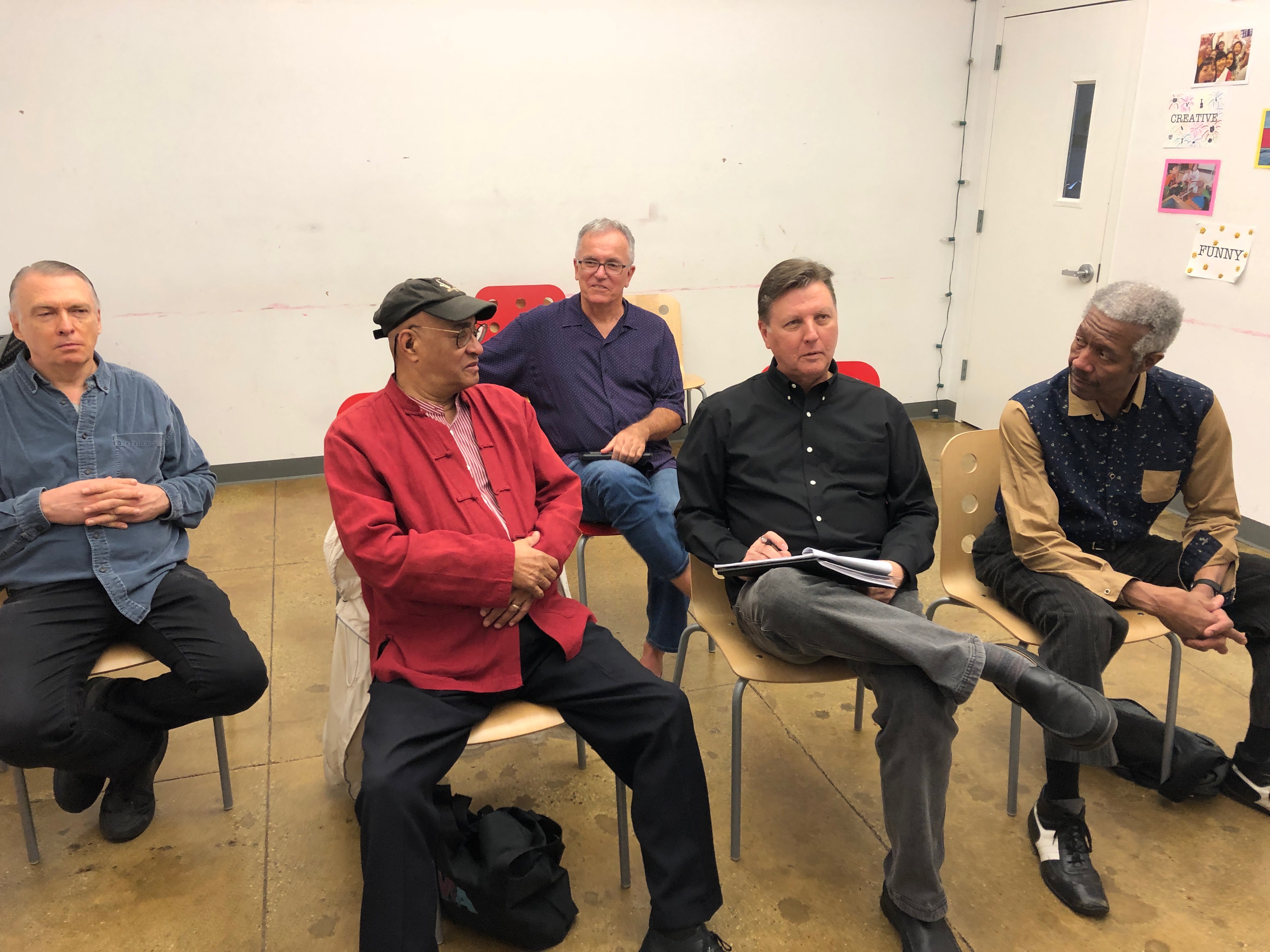Date: April 23, 2019
Venue: WingSpan Arts (NY)
By Dawoud Kringle
On Tuesday, April 23rd, 2019, Musicians For Musicians (MFM) held its thirteenth Public Musician’s Forum. It was actually the 47th public event MFM presented! Time flies when you’re having fun!

Photo by Roger Blanc
MFM President Sohrab Saadat Ladjavardi opened the meeting by introducing the keynote speaker; composer, producer, founder of Teknofonic Recordings and MFM member Adam Reifsteck. Reifsteck began his presentation with some autobiographical information.
One pertinent event he shared was, after struggling as a composer, electronic musician, and audio engineer; he attended a marketing conference he attended in 2014. with keynote speaker Seth Godin. During his talk, Godin said “People with passion find ways to make it happen.” This was a turning point for Reifsteck, and inspired him to really look at how he was handling his career, and how he could achieve his goals. He studied marketing, and how the successful businesses actually worked. He formulated a plan, and figured out a way to bring in consistent clients. He also founded a record label that focused on electronic music, and began to work with different producers. This was how he founded Teknofonic. It started as a label, and evolved into an educational platform for music producers, teaching digital marketing, coaching, webinars, and a virtual version of networking and social interaction with other music business professionals. These were part of Reifsteck’s effort to maximize revenue sources. He compared the vision of his company with that of MFM’s.
Ken Hatfield asked a somewhat confrontational, yet perfectly justified question; anyone who releases their own music finds out that there are many services available, all of which one must pay for. Does the Teknofonic service generate income for their clients, or just for Teknofonic? He went on to point out that for jazz musicians, the radio and other outlets do not accept digital submissions, the recording process is dependent upon the otherwise disappearing recording studios; and requires an actual acoustic environment to create and record the music, all of which is rapidly becoming less than cost effective. Reifsteck responded by saying that his business offered an alternative to the usual 360 deal record labels made (wherein the label gets a cut of everything; including publishing, tour revenue, and merchandise; a usurious variation of cross-collateralize). The alternative was services such as CD Baby, which one must pay for.
Reifsteck wanted to offer something in between, One of the things Teknofonic does that others do not do is offer coaching and an effort to guide the artist’s marketing and promotion. Some of the artists he signed went on to chart on iTunes and Billboard. Hatfield brought up the points that this model may not necessarily work for jazz, classical, or other acoustic based music, and expressed concern about the devaluation of music. Reifsteck pointed out that his business model primarily works with electronic music. His program attempts to serve the needs of electronic musicians. He keeps the marketing as much in a direct-to-audience format as possible.
This necessitates a digression, and begs the question of how to set up a business model that does not edge out musician whose music is not digitally based. MFM is attempting to reach out to all genres, and unite them as a single force. This shows the reality of different business models working with one genre of music, yet not working with, but potentially devaluing other genres. This question cannot be ignored; and its answer may very well determine the survival of a great many music professionals.
The question of how musicians get revenue from streaming was answered with a brutally succinct “you’re not.” This is a fact: YouTube pays $0.0006 per play. You have to have 2,333,133 paid plays to generate the federal government’s mandated minimum wage of $1400 a month. However, there is a legal machinery in place that is attempting to rectify this. This was followed with some lengthy discussion (with Hatfield dominating the input of statistics and information as he usually does) the problems of the present business models and the obstacles musicians face in getting paid for their work.
Hatfield continued his discourse, and reported on his participation in the USCO (United States Copyright Office) round table on reform of section 512 of the DMCA in Washington, DC. The details of his discourse are too lengthy for this article, and probably require a separate series of articles – or even a book.
Hatfield noted that there is a war going on at the Library of Congress. It sees itself as the repository of all content produced in the history of the United States, and making it available to everyone without monetizing it. The Copyright Office is trying to figure out how to protect the law of copyright. There’s never going to be an industrial base in the US again. It’s finished, and the political and economic leaders of the US know this, and see tech as the face of global business. Because we have fools like Trump making decisions about things they can’t understand, we’re in a state of limbo. And this brings up why it’s so important for musicians to educate themselves on how this works. We don’t need record labels anymore, but we need to know how to operate our businesses, and how the laws work. The tech industry has an inside track, and holds a dominant position in our business. Some people in the government think tech has too much influence. The Copyright Office wants to protect copyright owners, but has to bend over backwards to create the illusion that they’re giving tech what it wants. This, combined with what’s happening in the European Union shows that the tide is starting to turn. So, we have a chance to make a difference.
One interesting thing that Hatfield found in his diligent pursuance of justice was the Copyright & Small Claims Enforcement Act (the CASE ACT). If passed, this legal process empowers musicians to make legal claims against persons or entities who infringe upon their copyrighted material.
Inevitably, this leads us back again to the question of what to do about it. We can talk and talk until our noses bleed, and it will get us nowhere without action.
Saadat brought up an interesting point. MFM has been covering, and supporting, the Music Modernization Act (MMA) since its beginning. However, many musicians associated with MFM are unable to describe the MMA, and really don’t understand it. Hatfield offered a suggestion; convince these same people to actually go through the process of assigning ISRC codes, etc. Ask them, “I got paid. Did you?” Telling people is not enough; you have to show them, and they have to actually experience the process themselves. The older musicians came up in a world where people became famous because they could do something. Now, the younger generation thinks in the backwards terms of “I have to be famous before I can do anything.” And if the musicians don’t think they deserve to be paid, they won’t – and you’ll never convince them that you deserve to be paid either.
After a fascinating exchange of ideas, information, and anecdotes, Saadat brought up the newly operational MFM Members Portal. This is a directory and networking tool for MFM members on the MFM website. He demonstrated how to access the member directory, and how members can input their own information into it. He also revealed that MFM media, such as videos from past MFM events, and other benefits are now available.
Some impassioned debate about the value of these things, and the present tangible value of MFM flared up. Those who criticized Saadat had some perfectly admissible points. However, putting the machinery in place to accomplish all of MFM’s objectives is easier said than done; especially with limited resources to work from. MFM is wiggling its way out of an impasse: it cannot accomplish the goals of having attractive and tangible benefits to offer potential or undecided members without income, and it can’t generate the necessary income without members.
The fact remains, however, that the member portal and other existing benefits are a necessary step in the right direction. Now, two things must be done: 1. Members must enter their profiles into the directory. This will go a long way toward giving MFM members an idea of who does what, and of other services that are available. 2. Work towards implementing other tangible benefits for MFM members (one example; setting up a monthly concert / performance series where one MFM member will perform. This will be a very attractive incentive for musicians, and can generate income for MFM).
It’s clear that MFM needs to move into its next stage of development. The way things have been done – and the mindset behind it – have taken us as far as it can. MFM is moving beyond the confines of its own past; our methods and attitudes must move with it.

